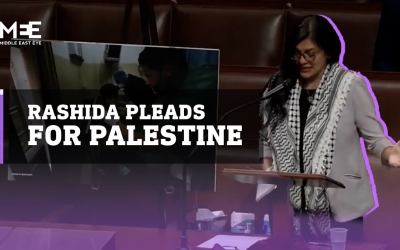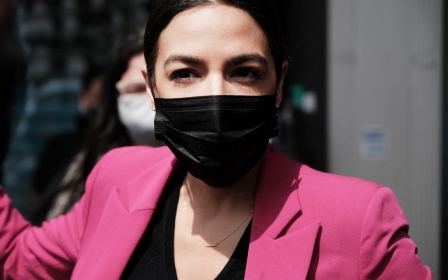US discourse is shifting on Israel-Palestine but policy yet to change
As news broke that the administration of US President Joe Biden approved a $735m arms deal to Israel while bombs were raining down on Gaza, progressives and Palestinian rights advocates voiced fresh anger at the White House.
Democrats on the House Foreign Affairs Committee held an informal meeting overnight to discuss the sale.
Reports emerged that Gregory Meeks, the chairman of the committee, would send a letter to the administration requesting a pause on the deal to allow for congressional review.
The move from the legislative body that is traditionally unquestioning in its support for Israel would have been unprecedented. A "watershed moment", one congressional staffer called it.
But the next day, Meeks confirmed that no letter would be sent and the sale would proceed, saying that "Israel has every right to defend itself".
New MEE newsletter: Jerusalem Dispatch
Sign up to get the latest insights and analysis on Israel-Palestine, alongside Turkey Unpacked and other MEE newsletters
The episode reflected an increased willingness to question America's unconditional backing of Israel, but it also demonstrated that this has not yet gathered enough momentum to affect policy.
"There's no question there's a shift," said Maya Berry, executive director of the Arab American Institute, adding that the change of perception was being driven by increased acknowledgement of Palestinian human rights.
Beyond condemnations of Israeli violence that has killed more than 200 people, including dozens of children, Berry said there had been a greater understanding of the broader dynamics of the conflict in US circles.
"There's a breakthrough that's happening, which is to understand that the occupation itself is violence, that the denial of Palestinian self-determination is violence, that the dispossession of the Palestinian people is violence," she told MEE.
Congressional advocacy
Congressman Mark Pocan, a prominent progressive who has been outspoken in criticising Israel, spelt out that broader awareness of the conflict in a tweet last week.
"Palestinians in Gaza live in an open-air prison under air, land & sea blockade with little access to water, food, electricity & healthcare," he wrote.
"Israel keeps expanding illegal West Bank settlements. This isn't about just the last week, but about decades of human rights violations."
In Congress, Pocan and other progressives are raising their voices in support of Palestinian human rights like never before.
On Wednesday, Alexandria Ocasio-Cortez, one of the more prominent members of Congress, introduced a resolution to block the $735m arms deal with Israel in an unprecedented move. Although the measure is unlikely to pass, it is breaking the taboo of questioning America's security relationship with Israel.
The US government awards $3.8bn in military assistance to Israel annually - making it by far the largest recipient of American aid.
Last week, Pocan organised an hour-long session on the floor of the House of Representatives to allow about 10 members to speak in favour of Palestinian rights.
"This is not a conflict between two states. This is not a civil war," Congresswoman Ilhan Omar said at the time.
"It is a conflict where one country, funded and supported by the United States government, continues an illegal military occupation over another group of people."
And it's not just progressives. Mainstream Democrats, including some who are usually staunch supporters of Israel, are expressing discomfort with Israeli policies and the war on Gaza.
"I am deeply troubled by reports of Israeli military actions that resulted in the death of innocent civilians in Gaza as well as Israeli targeting of buildings housing international media outlets," reads an opening sentence of a statement on the crisis by Senator Bob Menendez, a stalwart supporter of Israel.
Menendez, who chairs the powerful Senate Foreign Relations Committee, went on to rebuke Hamas and accuse it of endangering Israeli and Palestinian civilians, but his criticism of Israel remains significant.
Senior former officials are also speaking out.
"Hamas rocket attacks deserve strong condemnation. Israeli strikes into Gaza killing civilians also demand international opprobrium," ex-CIA chief John Brennan wrote on Twitter.
"If Israel shows the courage to support a two-state solution, more Palestinian leaders & people will reject violence & marginalize Hamas."
Ben Rhodes, who served as a deputy national security adviser under Barack Obama, has also been criticising America's approach to the crisis in his social media posts.
'Shocking' Biden stance
In public opinion and popular culture, there appears to be increased acknowledgement that the Palestinian cause is a human rights issue as well - at least among liberals.
New York mayoral candidate Andrew Yang was pressured into retracting a one-sided statement voicing support for Israel after facing a barrage of rebuking remarks online, including from activists, actors and politicians.
"There is a very major drastic shift in public discourse, compared to the last time Israel was assaulting Gaza in 2014. There's simply no comparison between the environment on both situations," said Palestinian-American analyst Omar Baddar.
"Right now, we are in a situation where it is absolutely mainstream for major celebrities who were not ever outspoken on this issue to now speak in opposition to Israel's crimes against Palestinians and demand accountability for Israel's behaviour from the US government."
For all the movement happening on the issue, America's official response to the current crisis is almost indistinguishable from previous wars - reasserting what Washington calls Israel's right to defend itself, refusing to condemn Israeli abuses and calling for de-escalation and restraint.
Yara Asi, a non-resident fellow at Arab Center Washington DC, said Biden's policy on the conflict had been "shocking", especially for a president who ran his election campaign on a platform of empathy and decency.
"There was the rumour that they wanted to deprioritise Israel-Palestine; they had a lot of domestic issues, they had Iran, they had China. And it's clear that you don't get to choose when these things spark up," Asi told MEE.
"You have to have a clear point of view. I wasn't exactly expecting significant shakeups. But I really thought that in their initial statement, they would at least mention the loss of Palestinian life, the loss of Palestinian children, the destruction that we were all seeing."
Biden has vowed to pursue a foreign policy centred on human rights and multilateralism, and his Secretary of State Antony Blinken often invokes the "rules-based system" as the basis of American diplomacy, but such rules appear overlooked when it comes to Israel.
For example, the administration has failed to condemn Israel's forcible displacement and house demolition campaign against Palestinians in the East Jerusalem neighbourhood of Sheikh Jarrah, with the White House merely expressing "concern" about Israel's settlement activity in what many experts around the world describe as a violation of international law.
The administration is even blocking UN calls for an immediate ceasefire and refusing to demand one publicly, against the requests of dozens of Democratic lawmakers, including Senate Majority Leader Chuck Schumer - a staunch Israel supporter.
The administration is resisting the pressure by saying it is focused on quiet diplomacy.
"Unfortunately, policy is only the last thing to change. These things always build up from the bottom up," Baddar told MEE.
"They start with grassroots activists sounding the alarm on what has happened and demanding a better kind of policy. And that information moves around. Public discourse shifts, and then the very last thing that would happen would be the policy shift.
"So all of this is a precursor for our upcoming change in American policy."
Slow process
As Palestinian rights activists work to change perceptions on the issue, pro-Israel groups are also pushing to portray Israel as the victim and cast critics as either ignorant of the conflict or implicit in supporting Hamas, which is designated as a terrorist group in the US.
The pro-Israel lobby AIPAC is running digital ads targeting Congress members critical of Israel, including Pocan and Rashida Tlaib. One ad shows Congresswoman Omar's face with a background depicting rockets flying over Tel Aviv and a caption that reads: "When Israel targets Hamas, Rep. Omar calls it an 'act of terrorism'."
And while Biden's unquestioning support for Israel has led to public expressions of gratitude on behalf of Prime Minister Benjamin Netanyahu, several Republicans are accusing the president of not doing enough to stand with Israel.
But many Democrats, including House Speaker Nancy Perlosi, have echoed Biden's uncritical backing of Netanyahu's government.
Numerous and complex factors drive Washington's support for Israel. Arming and defending Israel has been a long term US strategic interest in the Middle East, dating back to the Cold War when Israel was seen as an American counterweight to Soviet-backed Arab regimes.
That "special" American bond with Israel is at the core of Washington's geopolitical approach to the region.
Biden summed up America's strategic interest in empowering Israel in a Senate speech in 1986, in which he described US aid to the Israeli government as an "investment".
"Were there not an Israel, the United States of America would have to invent an Israel to protect our interests in the region," Biden said.
'Unfortunately, policy is only the last thing to change'
- Omar Baddar, analyst
Washington's long-term strategic postures often enjoy bipartisan support that translates into consistent policies across different administrations.
So despite the real shift in attitudes towards Israel in Washington and across the United States, a major realignment on the issue will likely be a slow process.
Take, for example, America's increasingly contentious alliance with Saudi Arabia. After the murder of Jamal Khashoggi amid the ongoing war in Yemen, Democrats rebuked the kingdom almost unanimously and called for re-examining the alliance with Riyadh.
Biden himself called the kingdom a "pariah" in 2019. But once he came into office, he did not fundamentally change the alliance.
The US president did end US support for Saudi Arabia's offensive operations in Yemen, but recently, Blinken discussed "bolstering Saudi defences" in a phone call with his Saudi counterpart.
The Biden administration has also refused to impose sanctions on Saudi Arabia's Mohammed bin Salman - despite acknowledging that he was most likely behind the assassination of Khashoggi, saying that Washington wanted to avoid a "rupture" in relations with Riyadh.
So when it comes to Israel - which still enjoys substantially more backing in Congress than Saudi Arabia - the shift in public opinion and among some politicians will take a long time to be reflected in policy.
"I wish it was quicker, but incremental change is apparently what needs to happen for some people," Berry said. "And it's the reason we're going to continue to be relentless in our pushing and our advocacy."
She added that Americans had a right to demand their tax dollars are not used to violate human rights.
"There should be hard questions to be asked of these members of Congress who want to talk about what's happening in Yemen - correctly, who want to talk about what's happening in China - correctly, who then fall in silence when it comes to Israel."
This article is available in French on Middle East Eye French edition.
Middle East Eye delivers independent and unrivalled coverage and analysis of the Middle East, North Africa and beyond. To learn more about republishing this content and the associated fees, please fill out this form. More about MEE can be found here.






